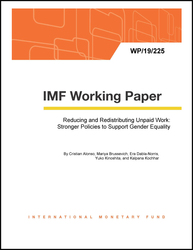
Reducing and Redistributing Unpaid Work: Stronger Policies to Support Gender Equality
Unpaid work, such as caring for children, the elderly, and household chores represents a significant share of economic activity but is not counted as part of GDP. Women disproportionately shoulder the burden of unpaid work: on average, women do two more hours of unpaid work per day than men, with large differences across countries. While much unpaid care work is done entirely by choice, constraints imposed by cultural norms, labor market features or lack of public services, infrastructure, and family-friendly policies matter. This undermines female labor force participation and lowers economy-wide productivity. In this paper, we examine recent trends in unpaid work around the world using aggregate and individual-level data, explore potential drivers, and identify policies that can help reduce and redistribute unpaid work across genders. Conservative model-based estimates suggest that the gains from these policies could amount to up to 4 percent of GDP.
Publication date: October 2019
ISBN: 9781513514536
$18.00
Add to Cart by clicking price of the language and format you'd like to purchase
Available Languages and Formats
| English |
Prices in red indicate formats that are not yet available but are forthcoming.
Topics covered in this book
This title contains information about the following subjects.
Click on a subject if you would like to see other titles with the same subjects.
Unpaid Work , Female Labor Force Participation , Gender Equality
Summary
Copyright © 2010 - 2026
Powered by:
AIDC



